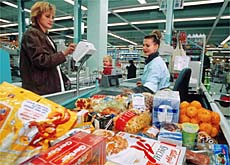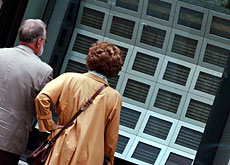Success in Iraq obscures reality of weak economy

Following the apparent success of the United States-led war in Iraq attention is returning to the state of the global - and Swiss - economies.
The Swiss economics minister, Joseph Deiss, on Thursday warned that Switzerland’s economic health is threatened by poor growth.
“Our general [economic] fitness is not very good, and we need to work on growth issues,” Deiss told swissinfo.
Deiss’s comments were underlined by a leading Swiss growth barometer, produced by the Zurich-based Swiss Business Cycle Research Institute (KOF), which said the national economy was set to stagnate this year.
The institute said that GDP growth was only likely to reach 0.8 per cent next year.
The gloomy forecast came as the IMF (International Monetary Fund) warned that the world’s economy could expect only moderate growth in 2003.
It added that a swift end to the war could leave lingering security worries that may cripple growth for decades.
“As near-term uncertainties over the conflict recede, the question of the hour is whether present sputtering global growth will suddenly lunge ahead into an immediate strong recovery,” IMF chief economist, Kenneth Rogoff said.
Alois Bischofberger, chief economist at Credit Suisse, told swissinfo that jubilation about the direction of the war had not diminished basic economic problems.
“We should not expect a sustained recovery,” Bischofberger said. “A short war won’t solve all the political and economic problems.”
With the war in Iraq apparently drawing to a close following the occupation of Baghdad, attention is shifting back to economic concerns.
Deiss’s warning
On Thursday, Deiss marked his 100th day in the job with a statement about the current situation in Switzerland.
He said that a decade of low or stagnant growth had eroded Switzerland’s relative position among OECD countries.
“I think we fell a little bit asleep on some elements which made our success in the past, which is why the government insists on these points, innovation, research, education.”
Political inertia
Bischofberger said a large part of the problem in Switzerland was caused by political inertia.
“Our internal economy is still, to a significant extent, subsidised and cartel [bound],” Bischofberger said.
“We are aware of what we should do… there is no lack of analysis about the problems. The more urgent problem is the lack of political will to push these measures through.”
Despite general pessimism about the Swiss economic outlook, Bischofberger believes there are signs of hope.
“Overall, compared to our major trading partners, the economy is still in a relatively favourable situation.
“Most parts of the export industry are competitive internationally”.
Lacklustre
According to a recent survey by the Business Economists’ Consensus – an index of expert’s predictions – growth could be just 0.6 per cent this year.
Unemployment has reached four per cent, while concerns about the financial security of key Swiss company pension schemes have angered many unions.
Key sectors such as tourism and banking are also suffering from overcapacity and steep falls in consumer demand around the world.
Furthermore, doubts about how long the war in Iraq could last have pushed up the value of the Swiss franc, undermining Swiss exports.
Spend or save?
Inevitably, worries about the sluggish Swiss economy have fuelled an ongoing media debate among political and opinion leaders about how the government should respond.
Since taking office at the beginning of the year, Deiss has positioned himself as a fiscal moderate who supports tax cuts over traditional stimulus packages.
“Our country needs higher growth and lower prices,” Deiss told the “Neue Luzerner Zeitung” last month.
He has repeatedly dismissed calls for a government stimulus programme.
The Swiss economic slowdown – which has mirrored European and global trends – has also forced the government to push for substantial budget cuts over coming years.
The cabinet is expected to ask parliament to support far-reaching cuts in the coming months, which is likely to trigger a prolonged argument about whether to raise taxes, or cut services.
“New taxes are the wrong instrument,” said Deiss recently. “I want to boost purchasing power. And that can be achieved with tax cuts.”
swissinfo, Jacob Greber
Progress by US-led forces in Iraq has fuelled positive sentiment on global stock markets.
However, economists such as Credit Suisse’s Alois Bischofberger, warn than deeper structural problems remain.
The KOF institute’s growth barometer warns that the national economy is set to stagnate in 2003, and will pick up to 0.8 per cent next year.
The IMF has also issued a gloomy forecast for 2003.
Swiss economics minister, Joseph Deiss, addressed Switzerland’s economic outlook on Thursday.
Deiss became economics minister at the start of 2003.
Swiss real GDP growth in Q4 2002 – 0.08 per cent
Unemployment, March 2003 – 3.9 per cent
Consumer prices, March 2003 – 1.3 per cent
Interest rates, March 2003 – 0.572 per cent (3-month Libor rate)

In compliance with the JTI standards
More: SWI swissinfo.ch certified by the Journalism Trust Initiative












You can find an overview of ongoing debates with our journalists here . Please join us!
If you want to start a conversation about a topic raised in this article or want to report factual errors, email us at english@swissinfo.ch.